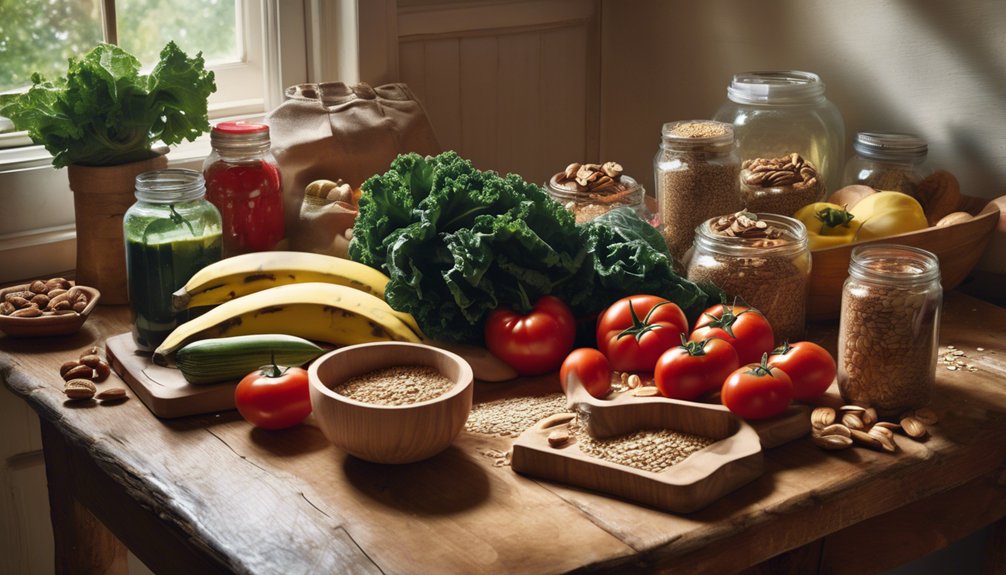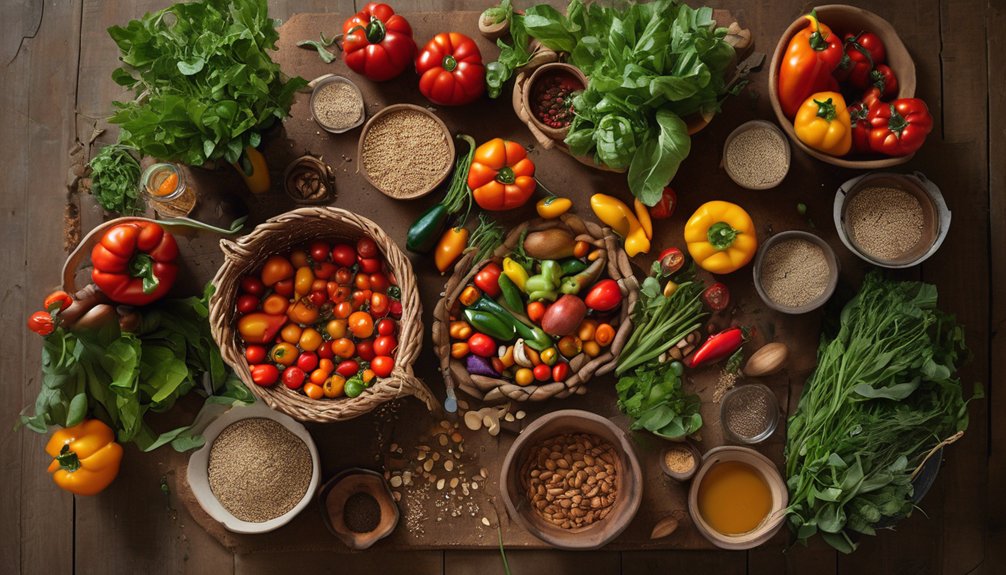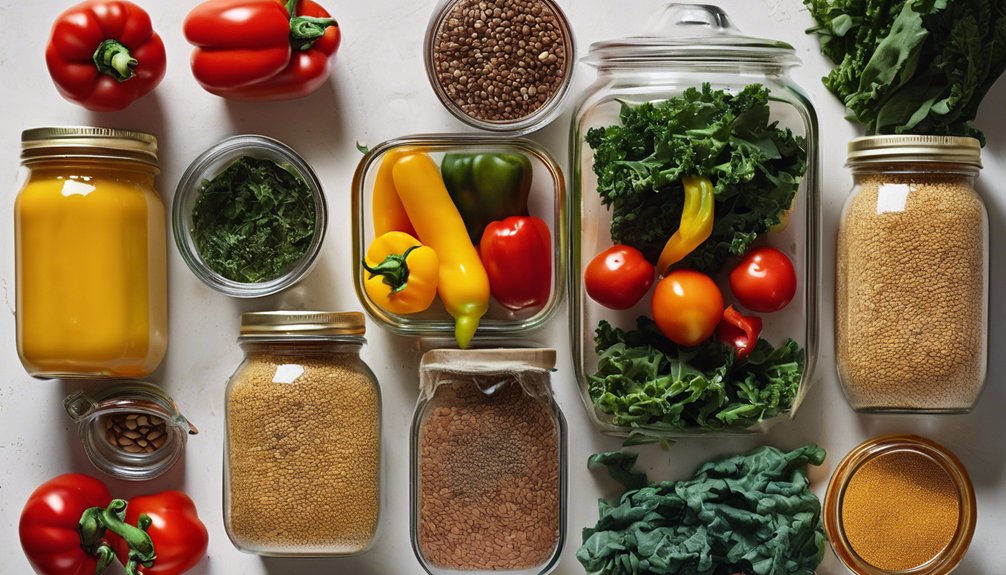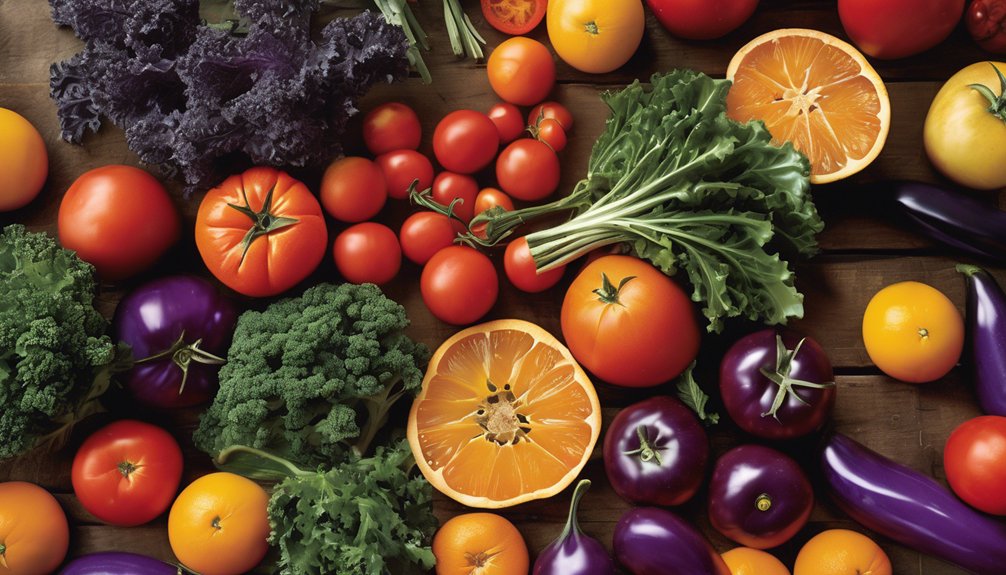Build a Healthy Grocery List
Building a healthy grocery list is essential for maintaining a balanced diet. You'll want to focus on whole foods like fresh fruits, vegetables, and lean proteins. Planning your meals in advance can help you avoid impulse buys and ensure you include nutritious options. To make the most of your shopping trip, consider how to organize your list efficiently. What are the key items you shouldn't overlook to support your health goals?
Key Takeaways
- Prioritize fresh fruits and vegetables for their nutrient density and minimal processing.
- Include lean proteins like chicken, fish, and legumes to support a balanced diet.
- Choose whole grains such as quinoa, brown rice, and oats for added fiber and nutrients.
- Select healthy snacks like nuts, yogurt, and hummus with veggies to satisfy cravings.
- Shop seasonally to enjoy fresher produce, enhance flavor, and support local farmers.
Understanding Whole Foods
When you dive into the world of whole foods, you're not just choosing healthier options; you're embracing a lifestyle that prioritizes nutrition and well-being.
Whole foods are minimally processed and rich in nutrient density, meaning they provide more vitamins and minerals per calorie than heavily processed alternatives. When you read food labels, you'll notice whole foods often have fewer ingredients, making it easier to understand what you're consuming.
Look for items like fruits, vegetables, whole grains, and lean proteins, as these are typically lower in unhealthy additives and preservatives.
Planning Your Meals
To make the most of your healthy grocery list, planning your meals can be a game-changer. When you take time to strategize, you set yourself up for success in meal prep and portion control. Planning helps you avoid last-minute unhealthy choices and ensures you'll enjoy nutritious, satisfying meals throughout the week. Here's a simple way to organize your meals:
| Day | Breakfast | Lunch |
|---|---|---|
| Monday | Oatmeal & fruit | Quinoa salad |
| Tuesday | Smoothie | Grilled chicken |
| Wednesday | Eggs & veggies | Lentil soup |
| Thursday | Yogurt & nuts | Veggie wrap |
| Friday | Whole grain toast | Stir-fry |
Essential Grocery List Items
Creating a healthy grocery list starts with incorporating essential items that nourish your body and support your meal planning efforts.
Focus on whole foods like fresh fruits and vegetables, lean proteins, and whole grains. These choices not only offer high nutrient density but also provide lasting energy.
Don't forget healthy snacks, such as nuts, yogurt, or hummus with veggies, which can keep you satisfied between meals.
Beans and legumes are excellent for adding protein and fiber to your dishes while being budget-friendly.
Lastly, consider healthy fats like avocados or olive oil to round out your meals.
Tips for Smart Shopping
As you embark on your grocery shopping journey, keeping a few smart strategies in mind can make a significant difference in both your budget and nutrition.
Start by making a list based on your meal plan; this'll help you stick to what you need. Look for budget-friendly options, like store brands or bulk items, which often provide the same quality at a lower cost.
When you're in the aisle, practice label reading—check for added sugars, sodium, and ingredients you can't pronounce. This not only informs your purchases but also helps you avoid unhealthy choices.
Lastly, don't shop when you're hungry; it's a surefire way to end up with impulse buys that could derail your healthy intentions.
Happy shopping!
Seasonal Produce and Its Benefits
When you choose seasonal produce, you're not just supporting local farmers; you're also benefiting from fruits and vegetables at their peak flavor and nutritional value.
Seasonal benefits come from eating foods that grow naturally in your area, making them fresher and more delicious. Plus, local sourcing often means fewer preservatives and a smaller carbon footprint.
Consider these advantages:
- Enhanced flavor: Seasonal fruits and veggies taste better, making your meals more enjoyable.
- Nutritional value: They're often packed with nutrients, as they're harvested at their prime.
- Cost-effectiveness: Seasonal produce is usually less expensive due to lower transportation costs.
Organizing Your Grocery List for Efficiency
To make your grocery shopping experience smoother and more efficient, organizing your list can be a game-changer.
Start by mapping out your grocery layout; categorize items by sections, like produce, dairy, and grains. This not only saves time but also helps you stick to your shopping habits, reducing impulse buys.
As you create your list, consider which items you frequently purchase and prioritize them based on their location in the store. That way, you'll move through each aisle with purpose.
Try to keep your list concise, focusing on what you truly need. By adopting this approach, you'll transform grocery shopping from a chore into a more enjoyable and streamlined experience, ensuring you'll grab everything you need without unnecessary backtracking.
Frequently Asked Questions
How Do I Handle Food Allergies When Grocery Shopping?
When grocery shopping with food allergies, prioritize label reading and cross contamination awareness. Always check for allergens in ingredients, and avoid products that might have come into contact with your specific allergens to ensure safety.
Can I Find Healthy Options at Dollar Stores?
Absolutely, you can discover healthy finds at dollar stores! By exploring options like canned vegetables, whole grains, and nuts, you can enjoy budget shopping while still prioritizing your health. Just read labels to make informed choices.
What Are the Best Alternatives to Processed Snacks?
Processed snacks might feel like they're calling your name, but nutrient-dense options like homemade granola bars, roasted chickpeas, and veggie chips will truly satisfy. You'll love how delicious and wholesome these alternatives can be!
How Do I Store Fresh Produce to Extend Shelf Life?
To extend freshness, store your produce in breathable bags or containers. Keep fruits and vegetables separate, and adjust humidity levels based on the type. Regularly check for spoilage to maintain optimal quality and flavor.
Are Organic Foods Worth the Extra Cost?
You might think paying more for organic foods is a silly choice, but consider the organic food benefits, like fewer pesticides and better nutrition. An organic price comparison often reveals long-term health savings that can't be overlooked.
Conclusion
Building a healthy grocery list doesn't have to feel like a game of Tetris. By focusing on whole foods, planning your meals, and shopping smart, you'll create a balanced diet that fuels your body. Keep seasonal produce in mind to maximize flavor and nutrition while supporting local farmers. With a well-organized list, you'll dodge those impulse buys and make healthier choices effortlessly. So grab your reusable bags and get started on your journey to better eating!












